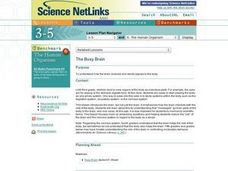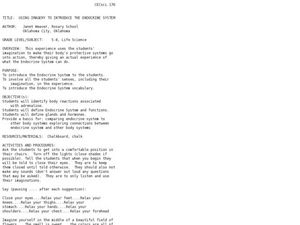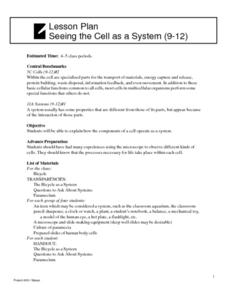Curated OER
Parts of a Microscope
In this biology lesson, students label and identify the different parts of a microscope. They complete 16 short answer questions about each part's function and complete 12 review questions in the end.
Curated OER
The Busy Brain
Students explore biology by completing a human body worksheet. In this human brain lesson, students identify the different anatomy within the brain and the functions those pieces form. Students read an article about signals in the brain...
Curated OER
Using Imaginary to Introduce the Endocrine System
Students examine the functions of the endocrine system. In this body protective systems lesson plan students identify body reactions, define terms and complete an activity.
Curated OER
Phineas Gage: Questioning Strategy
Focus on chapter two of Phineas Gage: A Gruesome but True Story About Brain Science with a questioning activity. After teaching and modeling several types of questions, learners work with partners and then independently to answer and...
EngageNY
Properties of Logarithms
Log the resource on logarithms for future use. Learners review and explore properties of logarithms and solve base 10 exponential equations in the 12th installment of a 35-part module. An emphasis on theoretical definitions and...
Royal Society of Chemistry
Green Plastics—Chemistry Outreach
How do green plastics reduce waste and environmental pollution? Budding scientists create and test a variety of compounds used in green plastics during an insightful experiment. Beginning with startling statistics and ending with...
Howard Hughes Medical Institute
Understanding Variation
Does where we live influence how our bodies express genetic traits? Explore variation in human skin color with an activity that incorporate video and hands-on learning. Individuals model the relationship between phenotypes and genotypes,...
101 Questions
Gas Station Ripoff
Ever wonder if you can trust the pump that pumps your gas? Budding mathematicians use video evidence to analyze the cost-per-gallon ratio at different intervals for three different pumps. Their goal is to identify the pump that is...
Curated OER
An Introduction to Sensors
Students list as many examples as they can of sensors in their homes and/or automobiles, define sensor and discuss what qualifies devices as sensors, explore human eyes as sensors while watching teacher demonstration, recognize that...
Curated OER
The Senses
In this senses learning exercise, students use a text book to complete 34 fill in the blank statements about the structures and functions associated with the 5 senses.
Curated OER
Modal Verbs Exercise 2
In this using the verbs must and have to in sentences online/interactive worksheet, students fill in the blanks with the correct verb and click the "Check" button to check their answers. Students fill in 24 answers.
Curated OER
Seeing the Courtroom and Legal System Through the Eyes of a Child
Students understand that law is a tool that provides for the protection of our individual rights and at the same time makes it possible for groups to live together.
Curated OER
Special Senses
In this special senses worksheet, 9th graders briefly describe the structure of a taste bud and the pathway a signal takes to the brain. Then they list the five basic taste sensations and homeostatic values of taste. Students also...
Curated OER
Trigonometric Transformations
Students perform transformation on trig functions. In this precalculus lesson plan, students relate the London Eye observation wheel to trig function. They use a TI navigator to visualise the parameter created by this view and relate it...
Curated OER
Cell-ebrations in Science
Students recognize that all living things are made up of cell and that they cannot easily be seen by the naked eye. Students become familiar with the use of microscopes as a tool for investigation.
Curated OER
The Real Bionic Man
Students examine the work that scientists have been doing to create artificial human parts. In this exploratory lesson plan students research the human eye and brain using the Internet.
Curated OER
Design: Line
Students employ an analysis and exploration of line use, to understand line in terms of design, style, and functionality. The learners experiment with line design. Understanding dynamic and diverse use of line will broaden students'...
Curated OER
Insects: Grasshoppers
Students examine grasshoppers as they practice following instructions. In this biology lesson plan, students identify the characteristics of grasshoppers and the functions of grasshoppers' external body parts.
Curated OER
Making Masks
Young scholars create paper masks linking the function and purpose of masks in the past, with modern life.
Curated OER
Introduction to Biology
Students examine a microscope and learn its functions. In this microscope lesson students prepare a wet mount slide and complete calculations.
Curated OER
Applied Science - Science and Math Lab (read without sight)
Learners consider the senses. In this sight and touch lesson, students discover what it is like to function like a person who is blind. They work in groups and individually on various activities to experience this condition. This lesson...
Curated OER
Learning About Pointillism
Students read a biography about George Seurat and examine the Pointillism style of painting. They create Pointillism style paintings of apples and consider how the viewer's eye mixes color in the interpretation of the painting.
Curated OER
Three-Dimensional Ceramic Sculptural Forms Inspired by the Paintings of Wassily Kandinsky
High schoolers analyze / deconstruct elements of design used in Wassily Kandinsky's paintings in order to synthesize the elements into a three-dimensional form. Works may be functional or non-functional.
Curated OER
Seeing the Cell as a System
Students explain how the components of a cell operate as a system. Students examine a bicycle and find out if parts were arranged differently, could the system still be carried out. They look at cells as well and see what function they...

























